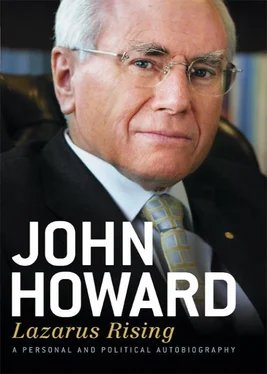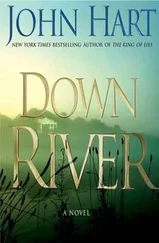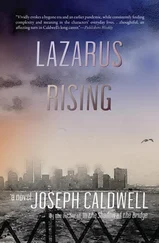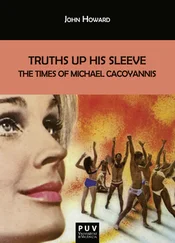Quite early, I established the Swanson Committee of Review into the Trade Practices Act. I wanted the act loosened and made more business-friendly; one of the reasons the Australian economy was performing badly was that too much red tape and regulation had been imposed on the business community. Malcolm Fraser strongly supported the review.
He did, however, backtrack on a promise to abolish the Prices Justification Tribunal. It was set up by Whitlam, and required large companies to obtain approval for price increases. It was impractical and a hindrance for business. Shortly after I became minister, Fraser rang and said it might be necessary to ‘give Hawke a win by going soft on our pre-election promise to get rid of the Prices Justification Tribunal'. Although it ran against our deregulatory thrust, I didn’t, at this early stage, question Fraser’s judgement, and we eased away from our commitment to abolish the tribunal. In those early months of government I believe that Malcolm Fraser thought that, with the odd gesture, he might win the grudging cooperation of the union movement.
At that time the Trade Practices Act penalised secondary boycotts by companies, but not by unions. I thought that this was a double standard, and therefore wrong. Unions were, for example, placing boycotts on petrol deliveries by certain tanker drivers, which forced up the price of petrol for some motorists. If a company did something like that it would be penalised, yet the unions were not.
I asked Thomas Swanson to look at this. Perhaps influenced by the conventional thinking, Swanson’s review did not recommend applying the secondary boycott law to unions. He did, however, suggest other changes which reduced the regulatory load on business, which we largely adopted. With Malcolm Fraser’s support I persuaded cabinet to bring unions within the secondary boycott reach of the Trade Practices Act, despite Swanson’s recommendation otherwise.
Thus was born what became Sections 45(D) and (E) of the Trade Practices Act, which imposed substantial penalties on unions similar to those for companies that engaged in secondary boycott conduct. It was removed from the Trade Practices Act for a period of time under the Keating Government, only to be returned to the legislation when I became Prime Minister. It survives to this day.
This was an historic change in the law affecting unions. It outraged the union leadership, particularly Bob Hawke. When the legislation was published I agreed to talk both to business groups and the unions regarding its provisions. At a meeting in Parliament House attended by Hawke as president of the Australian Council of Trade Unions (ACTU), as well as leaders of the public sector unions, Hawke glared at me across the committee room table and said, ‘If this goes through there will be blood in the streets.’ It was a nonsensical threat and one which was counterproductive. It confirmed my view that the proposal struck at the heart of the privileged position of the union movement, and I was more determined than ever that it should become law.
As Minister for Business and Consumer Affairs I had administrative responsibility for the Industries Assistance Commission. Tariff policy was, therefore, another issue I confronted. Up until then I had supported the prevailing orthodoxy.
This issue came to prominence after the Fraser Government, on 28 November 1976, devalued the Australian dollar by 17.5 per cent. Being a member of the economics committee of cabinet, I attended the cabinet discussion on devaluation. I strongly supported the decision, believing, as did Fraser, that Australian industry needed the competitive boost that the devaluation would confer on Australian exporters, because it would make their products cheaper on world markets. Likewise, it would help local manufacturers because the devaluation made imported products dearer and therefore less competitive.
It was that last point which brought in tariffs. Existing tariffs on imported goods already made them dearer for Australian consumers, therefore it was argued that unless some of those tariffs were cut following the devaluation, an unfair additional burden would be placed on consumers and importers. The contrary argument, which I supported, was that it would be self-defeating to reduce tariffs significantly, as one of the reasons for the devaluation had been to help local manufacturers.
Those who attacked our decision not to cut tariffs said that the higher prices of imported goods produced by devaluation would drive up inflation. This did not happen as fierce competition amongst retailers, in a still-recessed economy, meant that price increases were kept to a minimum.
In the early days of the Fraser Government, there was no stauncher high protectionist than Bob Hawke. He frequently invoked a cheap jibe against the Industries Assistance Commission, that it was really the Industries Assassination Commission. It would take the relative safety of government, and security in the knowledge that the Coalition opposition would support him, before Bob Hawke became a supporter of tariff reform.
Shortly after the devaluation, Fraser split the Treasury into two departments: Treasury and the Department of Finance. It made sense as Finance could focus more heavily on expenditure control. Fraser believed that Treasury had been responsible for a damaging press report of an earlier devaluation discussion in cabinet; this could have influenced at least the timing of his split of the Treasury. The circumstances provoked Treasury resentment, which was a pity because of the intrinsic worth of the change.
* * *
Malcolm Fraser frequently encouraged me to appear in the media and talk generally on economic issues, provided that I kept in line with government policy. My profile received a huge boost when, following a Premiers’ Conference proposal, Fraser announced that there would be a price-wage freeze for a period of three months from 13 April 1977. The Prices Justification Tribunal was charged with monitoring the freeze. Whilst it had a certain popular, limited appeal, it was economically unrealistic and could not last long. I was put in charge of the freeze, not even knowing anything about it until the announcement was about to be made.
The public liked the idea because it appeared that the Government was ‘doing something’ about inflation. The serious media ridiculed the approach, whilst more popular media took an enormous interest in the issue. I had immediate contact with all of the major employer groups and for a period of time it looked, against all expectations, as if the proposal might do some good. After several weeks it was accepted that it could not be continued because of its longer-term unworkability. There is some evidence it may have had a short-lived constraining influence on some price increases.
In May 1977 Malcolm Fraser appointed me as Minister Assisting the Prime Minister, which involved helping with the PM’s correspondence and lower-order decision-making. I continued my full duties as Minister for Business and Consumer Affairs. It was a strong endorsement by the Prime Minister of the work that I had done there. I was happy with the promotion, but conscious of some resentment building amongst colleagues that my rise had been rather too rapid.
As a minister I worked closely with the National Country Party (later National Party) trio of Doug Anthony, Peter Nixon and Ian Sinclair. I liked them a lot. Anthony was strong and open, an ideal Deputy PM to Fraser. His languid, country style masked immense political shrewdness. Nixon was a tough political operator who defended country interests whilst recognising that electoral arithmetic was inexorably moving against his party. He gave me good early advice about being a minister. Sinclair was one of the most naturally gifted politicians I have known. He was intelligent, could absorb a brief rapidly — I don’t think that he read any submissions until after cabinet meetings had started — and was versatile and talented on his feet.
Читать дальше












